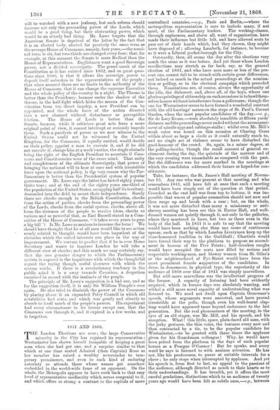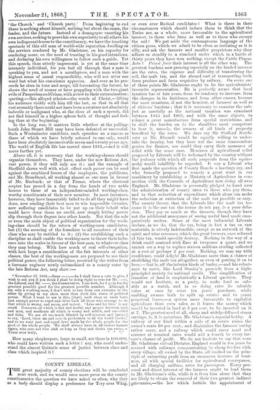18-11 AND 1868.
THE London Elections are over ; the large Conservative minority in the City has regained its representation ; Westminster has shown herself incapable of keeping a great man when she had got one, and a surprise similar to that which at one time seated Admiral (then Captain) Rous as her member has raised a wealthy newsvendor to tem- porary prominence, and even to such kind of enduring notoriety as attends those whose names get somehow embedded in the world-wide fame of an opponent. On the whole, the Metropolis appears to have sunk back to that easy level of representative mediocrity which seems congenial to it, and which offers so strong a contrast to the capitals of more
centralized countries,—e.g., Paris and Berlin,—where the metropolitan representation is sure to include many, if not most, of the Parliamentary leaders. The working-classes, through supineness, and above all, want of organization, have made their influence but little felt, and have allowed seats to pass out of their hands which, had they chosen, they might have disposed of ; allowing Lambeth, for instance, to become as it were a Liberal pocket-borough for the City.
Outwardly, then, all seems the day after the elections very much the same as it was before. And yet those whose London recollections may stretch as far back, say, as the general election of 1841, and who have seen more or less of the pre- sent one, cannot fail to be struck with certain great differences, not indeed so much in the actual proceedings at the nomina- tion or polling, as in the electoral campaign which preceded them. Nominations are, of course, always the opportunity of the idle, the dishonest, and, above all, of the boys, whose one gloriousprivilege of citizenship on such occasions is to bawl them- selves hoarse without interference from a policeman; though the one for Westminster seems to have formed a wonderful contrast with the old hustings' scenes on the steps of St. Paul's, Covent Garden, when the most popular candidates of the day,—e. g., Sir de Lacy Evans,—were absolutely inaudible at fifteen yards' distance, and the proceedings never ended without the accompani- ment of missile eggs and cabbage-stalks ; whilst even Mr. Mill's weak voice was heard on this occasion at Charing Cross within about as large a circle as it could naturally reach to, and no single act of violence seems to have disturbed the good-humour of the crowd. So, again, in a minor degree, at the polling-booths, though the small amount of general ex- citement during the day, the quietude of the morrow and of the very evening were remarkable as compared with the past. But the difference was far more marked in the meetings at which the candidates addressed their future or hoped-for con- stituents.
Take, for instance, the St. James's Hall meeting of Novem- ber 13. Any one who was present at that meeting, and who remembers 1841, will have felt at once that such a meeting would have been simply out of the question at that period. Crowded as the vast hall was from top to bottom, it was im- possible that waves of popular commotion should not now and then surge up and break with a roar ; but, on the whole, it was not more disturbed than many a missionary or anti- slavery meeting has been ere this in Exeter Hall, and well- dressed women sat quietly through it, not only in the galleries, where they mustered in force, but two or three even in the body of the hall. In 1841 it is safe to say that the meeting would have been nothing else than one scene of continuous uproar, such as that by which London Liverymen keep up the time-honoured tradition in the Guildhall ; Chartists would have forced their way to the platform to propose an amend- ment in honour of the Five Points ; half-drunken roughs would have occupied the seats now filled by serious and respectable working-men, and blowzy women from St. Giles's or the neighbourhood of Pye Street would have been the most prominent female supporters of the candidates. In dress, in demeanour, in physical type, the superiority of the audience of 1868 over that of 1841 was simply marvellous.
But still more marvellous was the intellectual progress of the former. A capacity of listening had been evidently acquired, which in former days was absolutely wanting, and withal a still more novel capacity of understanding what was listened to. We need not dwell upon Captain Grosvenor's speech, whose arguments were ancestral, and have proved irresistible at the polls, though even his well-learnt clap- trap would have appeared tame beyond endurance to the last generation. But the real phenomenon of the meeting, in the eyes of an old stager, was Mr. Mill, and his speech, and his reception. What! this little, spare, plain-faced old man, with the jerky gestures, the thin voice, the features every now and then contracted by a tic, to be the popular candidate for Westminster,—to be greeted with three times the applause given for his Guardsman colleague ! Why, he would have been pelted from the platform in the days of such popular heroes as a Feargus O'Connor ! But he speaks, and every word he says is listened to with anxious attention. He has not, like his predecessor, to pause at suitable intervals for a cheer ; he only stops when interrupted by applause. And yet his speech is, from first to last, no appeal to the passions of the audience, although directed as much to their hearts as to their understandings. It has breadth, yet it offers the most careful gradations, distinctions which to an audience of twenty years ago would have been felt as subtle ones,—e.g., between 'the Church ' and 'Church party.' From beginning to end there is nothing about himself, nothing but about the cause, the leader, and the future. Instead of a demagogue vaunting his own services, seeking to prove his own superiority to all others, his own indispensableness to the constituency, we have the touching spectacle of this old man of world-wide reputation dwelling on the services rendered by Mr. Gladstone, on his capacity for rendering more, on the need of trusting in his good intentions, and declaring his own willingness to follow such a guide. Yet this speech, thus utterly impersonal, is yet at the same time intensely individual, for you feel all through that a man is speaking to you, and not a mouthpiece, and a man with the highest sense of moral responsibility, who will not utter one word but what his conscience approves. And ever as he pro- ceeds he rises in tone and scope, till forecasting the future, he shows the need of sooner or later grappling with the two giant evils of Pauperism and Crime, with a view to their extermination ; quoting,—this alleged atheist—the words of Christ,—lifting his audience visibly with him till the last, so that in all that vast assembly there could not have been a creature not absolutely imbecile or malignant who, at the close of such a speech, did not find himself in a higher sphere both of thought and feel- ing than at the beginning.
In the long run, it matters little whether at the polling- booth John Stuart Mill may have been defeated or successful. Such a Westminster candidate, such speeches on a canvas as those of which we have briefly referred to one only, would have been absolutely inconceivable seven-and-twenty years ago. The world of English life has moved since 1841,—and it will move further yet.
Above all, it is necessary that the working-classes should organize themselves. They have, under the new Reform Act, vast power, if they will only use it ; and the example of Sheffield shows well with what effect such power can be used against the combined forces of the employers, the publicans, and Mr. Broadhead, all working almost as one man in favour of Mr. Roebuck; or that of Frome, where the electoral sceptre has passed in a day from the hands of two noble houses to those of an independent-minded working-class, worthy constituents of their new member. In most instances, however, they have lamentably failed to do all they might have done, now sending their best men to win impossible victories, now suffering candidates to be put up on their behalf who could have done them no credit, now simply letting power slip through their fingers into other bands. Not that the sole or even the main object of political organization for the work- ing-class should be the return of working-men candidates, but (1) the securing of the franchise to all members of their class who may be entitled to it ; (2) the establishing such a discipline as shall enable the working-men to throw their influ- ence into the scales in favour of the best men, to whatever class they may belong. With how much of real self-abnegation, with how large a consideration of the fair interests of other classes, the best of the working-men are prepared to use their political power, the following letter, received by the writer from a foreman engineer newly enfranchised as a county voter by the late Reform Act, may show :—
" November 17, 1868.—Dear —,—As I shall have a vote to give, I wish to ask you if you think I shall be doing right to vote for Mr.
the Liberal, and Mr. —, the Conservative. I am both, for I go in for the greatest possible good for the greatest possible number. Although I am only a working-man, I don't wish to run from one extreme to the other by giving to my class more than their fair share of political power. What I want to see is this, [that], each class or caste have just enough power to repel and drive back all those who attempt to do that which is wrong, and mean, and unjust. 'Live and let live,' is my creed. Conserve all which is fair and useful, and proper between man and man, and eradicate all which is wrong and selfish, and one-sided and false. We aro all too much blinded by self-interest, and [prone] to cry, 'Lord, bless ma and mine in preference to all the world beside ;' and so we want just and equal laws made by' the whole people for the good of the whole people. We shall always have in all classes human tigers, who care not who sink so long as they and theirs can swim. — Yours over truly, * *,,
How many shopkeepers, large or small, are there in 100,000, who could have written such a letter ? nay, who could under- stand the almost Quixotic sense of justice between class and class which inspired it ?







































 Previous page
Previous page